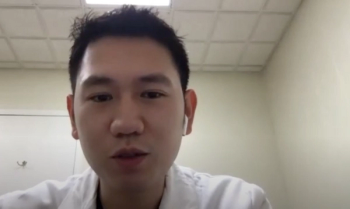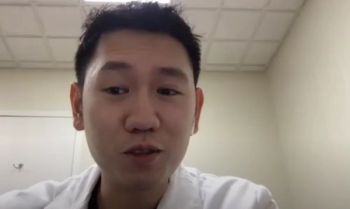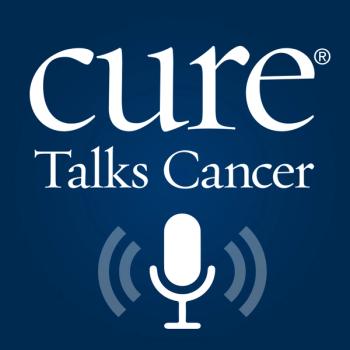
Doctor turned patient with cancer, Dr. Dan Tran, discusses how research and new medicine can help your hang onto hope during the cancer journey.

Doctor turned patient with cancer, Dr. Dan Tran, discusses how research and new medicine can help your hang onto hope during the cancer journey.

Dr. Dan Tran discusses his stage 4 lung cancer diagnosis at age 30, and how he has managed the shift from doctor to the patient with cancer.

Ultra-precise drug targeting brings new hope for patients with non-small cell lung cancer that harbors rare mutations.

Here is a list of some recent trials that launched within the cancer space in October.

In this episode of the �“CURE Talks Cancer” podcast, we looked back on CURE’s Lung Cancer Heroes event and recognized each winner that helps bring together the lung cancer community to raise awareness.

The FDA’s approval or Opdivo (nivolumab) and Yervoy (ipilimumab) for the frontline treatment of patients with unresectable malignant pleural mesothelioma was desperately needed, says a thoracic oncologist at Memorial Sloan Kettering Cancer center. However, some questions remain.

Bonnie Addario, our co-founder, board chair, survivor, and inspiration for thousands of patients here and around the world, shares the powerful stories of lung cancer patients and how they found ways to survive – and thrive -- in her book, The Living Room.

Two physicians, a nurse and a patient advocate were honored during CURE®’s first ever Lung Cancer Heroes program.

Larry Whipple had to travel 1,500 miles from his hometown for a second opinion after he was diagnosed with advanced lung cancer, but through the course of his treatment he had to remain in isolation to avoid further illness.

The Food and Drug Administration’s approval of Opdivo in combination with Yervoy for patients with unresectable malignant pleural mesothelioma marks the first new systemic therapy approved in more than 15 years in this setting.

There is no approved treatment that targets the KRAS p.G12C mutation that drives some cancers like non-small cell lung cancer. But a recent study shows how the experimental drug sotorasib sparked responses in some patients with advanced non-small cell lung cancer that harbored the mutation.

Four exceptional heroes will be honored along with the Lifetime Achievement award winner, who has provided a significant impact in the lung cancer community.

The addition of immunotherapy to radiotherapy increased the overall survival of patients with cancer who developed brain metastases, according to new research.

From the passing of famed Game of Thrones actress Dame Dianna Rigg after a lung cancer diagnosis to the recording of a confrontational call between a three-time cancer survivor and her senator’s staffer, here’s what’s happening in the cancer headlines this week.

This week on the “CURE Talks Cancer” podcast, we spoke with Larry Whipple — a lung cancer survivor who became his own best advocate — about how his insistence on the best care led to results he could only dream of, and how other patients with cancer can take an active role in their own care, too.

Dr. Nathan A. Pennell discusses the key genetic markers for treating patients with non-small cell lung cancer with targeted therapies.

The Food and Drug Administration approves Gavreto for treatment of patients with metastatic, RET fusion-positive non-small cell lung cancer.

The novel next-generation ALK tyrosine kinase inhibitor improved survival, compared with Xalkori, in patients with ALK-positive non-small cell lung cancer, potentially representing a new option in the first-line setting.

The test was also approved as a companion diagnostic test to determine which select patients with metastatic castration-resistant prostate cancer could benefit from Rubraca, as well as for three frontline TKIs in patients with non-small cell lung cancer.

The FDA has approved a generic form of the intravenous chemotherapy pemetrexed for use by itself in patients with locally advanced or metastatic non-squamous non-small cell lung cancer that has not progressed following four cycles of initial platinum-based chemotherapy.

Specific measures of a tumor’s texture and intensity as they appear on CT images can help determine how much treatment patients with early stage lung cancer need, a study found.

In this episode of the “CURE Talks Cancer” podcast, we spoke with Dr. Dan Tran about his journey with stage 4 lung cancer and what advice he offers other survivors and patients with cancer.

If approved by the FDA, Imfinzi could be administered every four weeks at a fixed dose in patients with stage 3 NSCLC after they received chemoradiation, as well as in patients with previously treated bladder cancer.

The Food and Drug Administration granted a priority review to the new drug application for trilaciclib for patients with small cell lung cancer.

“Therapeutic trials are very, very important because thanks to them, our patients are living longer,” said Dr. Narjust Duma. “But (physicians) also need to stop and ask how our patients are living.”